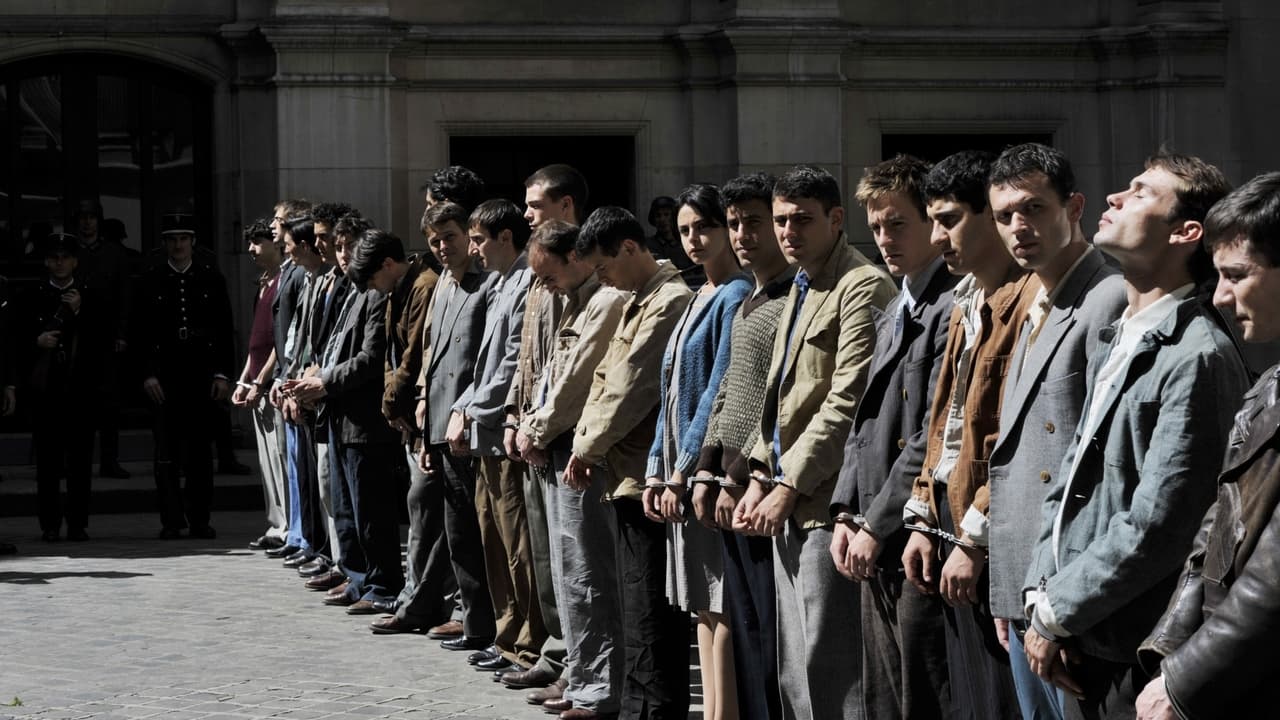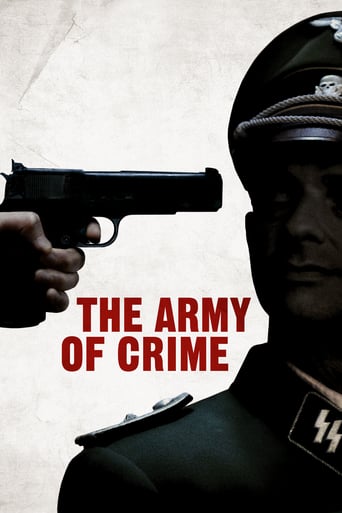

All that we are seeing on the screen is happening with real people, real action sequences in the background, forcing the eye to watch as if we were there.
... View MoreIt’s not bad or unwatchable but despite the amplitude of the spectacle, the end result is underwhelming.
... View MoreIt is interesting even when nothing much happens, which is for most of its 3-hour running time. Read full review
... View MoreTrue to its essence, the characters remain on the same line and manage to entertain the viewer, each highlighting their own distinctive qualities or touches.
... View MoreI was pleasantly surprised by this film. The movie is very well made. The lighting and cinematography is impeccable. The scenes are constructed beautifully. The casting was brilliant. The actors did a very good job. The direction was good. Robinson Stévenin and Gregoire LePrice-Ringuet were fantastic. Virginie Ledoyen is also maturing into a great leading lady.Aside from the technical brilliance of the film in its fine classic film making, the movie is about heroic men and women who risked their lives for their country even though many of the characters were immigrants. These men and women loved France and died for their rights as well as for the rights of their families and fellow citizens. There were some controversies surrounding this film due to possible historical inaccuracies, yet, I found this movie objective in its portrayal of the characters. There are no long drawn melodramas here but just characters who are compelled to fight for their freedom and the rights of others. I highly recommend this film.
... View MoreA rousing, lengthy and straightforward political thriller about a key aspect of the French resistance during the Second Wold War, Robert Guédiguian's new film focuses on the movement's early stages, when both leaders and foot soldiers made up an organization called the FTP-MOI: Francs-tireurs et partisans – main-d'oeuvre immigrée or Partisans and Irregulars - Immigrant Work Force. it was made up of non-Party member communists or communist sympathizers of foreign, often Jewish, origin -- Spanish, Romanian, Hungarian, Polish, Italian, or, like the director himself, Armenian. Of course resistance tales have been told before, most recently (in a film seen in the US) Danish director Ole Christian Madsen's Flame and Citron, about his country's most famous resistance fighters. Some will point to Jean-Pierre Melville's grim 1969 saga Army of Shadows/L'armé des ombres, which was given its first-ever US release to extravagant praise in 2006. This particular subject was treated in the 1976 French feature L'affiche rouge.Guédiguian's film lacks the noirish flavor of Melville or the Butch Cassidy and Sundance panache of Madsen's film; but it starts well with Grégoire Leprince-Ringuet and Robinson Stévenin as two brave young men who begin acting on their own, and later are recruited to serve a more organized cause. There were always contrasts between young upstarts and disciplined old-timers. Resistance fighters worked outside the law and sub rosa; the "shadow" army was an army of "crime." Though the phrase "Army of Crime" is a Vichy smear issued after the principals of this story were rounded up and eliminated, the resistance life always attracted rebels and outliers.The gentle Armenian poet Missak Manouchian (Simon Abkarian) is the leader. His ballsy girlfriend Mélinée (the lovely Virginie Ledoyen) marries him and becomes a passionate supporter after his release from internment gradually turns him from peaceful propagandist to one capable of throwing a grenade into a German marching squad and taking out a dozen German soldiers (an incident neatly filmed here). He gets to know fiery young Marxist bomb-rigger Thomas Elek (Leprince-Ringuet) and swim-champion-pistol killer Marcel Rayman (Stévenin). Marcel becomes infuriated when his parents are taken away and he learns that he won't ever see them again. He begins asking one German officer after another for a light and then pulling a pistol and killing them. He's good at less close range too and gives Missak a lesson in marksmanship. Thomas blows up a Nazi literary gathering by planting a big copy of Das Kapital with a time bomb inside.Older group leaders periodically chide the younger ones for acting independently and not maintaining cover; but it is one of the older ones who eventually names many members of the group after capture. Various group scenes, including an Armenian musical celebration with Zorba-style performances visited by a group of French cops, show that the authorities are onto the foreign communists and the rashness of one can endanger many.We get a look at French cops called upon by German occupiers to squash the resisters. They enlist a certain Inspector Pujol ( Jean-Pierre Darroussin), who plays a dubious Judas game of informing, rounding up Jews, and gaining rapid promotion by the French Gestapo while simultaneously sympathizing with the partisans, sleeping with a Jewish girl, and doling out favors to her, including gentler treatment for her interned family members. She wants to be a partisan too, but seems destined to go the way of the anonymous protagonist of Max Färberböck's A Woman in Berlin.The FTP-MOI throws out flyers (from above, so they won't be seen) urging the French to sabotage Vichy-run industries. Their other mission is to strike visible blows at the Nazis, assassinating major figures of the Nazis in France like General Julius Ritter.A theme of the film is the complex bonds forged among immigrants and the loyalties among resisters. Missak , whose parents were murdered by Turks, looks upon his Parisian communist friends as his new adopted family. Marcel knows what remains of his family is only his little brother Simon (Léopold Szabatura), and so takes him everywhere; unfortunately that meant that in a raid that targets Marcel, Simon is taken away. An original touch is a homage to the young militant, Henri Krasucki (Adrien Jolivet), who took it upon himself to bring Simon back alive from the concentration camp where they were sent.In The Army of Crime, the mix of nationalities and motivations is continually interesting and harmonizes nicely with the picture of how quite disparate individuals came together Very important also is that toward the end, Guérdiguian films sequences of the mass corralling and deportation of Jewish people by the French out of a stadium, an infamous moment that deserves to be seen as well as read about. The film is less effective in evoking strong emotion, and despite its generally favorable reception in September in France (after a Cannes summer debut), it's been criticized for a lackluster mise-en-scene. Some communist historians in France have insisted that Marcel is over-mythologized; that there was more restraint and coordination and more direct Soviet supervision than is shown. However the film's strengths remain its focus on youth and its strong ethnic and cultural mix.This is involving, fascinating stuff, and as good an evocation of that place and time as I can think of, but it doesn't seem as personal as the other films by Guédiguian that I've seen -- The Town Is Quiet (in US theaters) and Lady Jane (SFIFF). But since he is a communist of working-class origins with an Armenian father, it may be in another sense the most personal thing he has done. Another film of his, the 2006 Armenia/Le voyage en Arménie, is about rediscovering Armenian roots.Shown as part of the Rendez-Vous with French Cinema at Lincoln Center, March 2010.
... View MoreRobert Guediguian has never been afraid to go to the mat with older and respected talents. Despite the odd foray by the likes of Renoir (Toni) and Marcel Tourneur (Justin de Marseille) the Marseille area is widely acknowledged as being under the ownership of Marcel Pagnol but this didn't prevent Guediguian turning out a series of consistently high-quality movies based in and around Marseille - Marius et Jeanette, Le Ville est tranquille, Marie-Jo And Her Two Loves, etc and now he horns in on Claude Berri (Lucie Aubrac) and Jean-Pierre Melville (L'Armee des ombres) territory with a film about the Resistance - he even manages to plug L'Armee des Ombres as if to tempt fate. It's nice to see Lola Namark and Ariane Ascaride in the same movie once again (albeit they never share a scene) but then it's Great to see Ascaride in anything. Simon Abkarian is the nearest thing to a leading man and Virginie Ledoyen as his wife revisits territory she staked out in Bon Voyage. Altogether it's a satisfying exploration of the rag-tag volunteers who comprised the non-French aspect of the Resistance and well worth a look.
... View MoreAnother résistance tale, excellent settings, clothes, etc., but a very flat plot that never grips you. That, plus the actual length of the film make it feel eternal. The theoretical "good guys" - the résisrance, are mostly communists, quite a few of them rather sinister. One feels that their ideas are very similar to those of the Nazis they're trying to fight and, frankly, it's six of one, half a dozen of the other. And,like so many French films, this one tries to rewrite history. Because, much as the French hate to admit it, most of the population just wanted to survive the war and disliked the résistants, who provoked dangerous German retaliation. Of course, after the war EVERYBODY turned out to have been in the résistance and had behaved heroically. All in all, a disappointing movie. Much better stuff has been filmed about that period of French history.
... View More